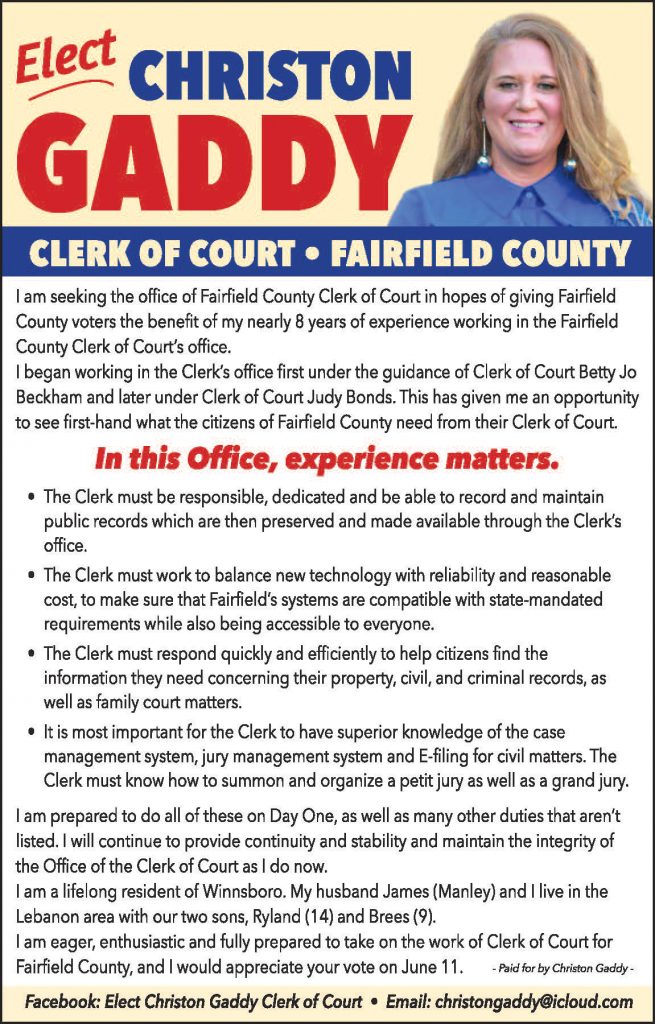WINNSBORO – Fairfield County is bringing in more experts to help counter Richland County’s growing opposition to a proposed wastewater treatment plant.
Meantime, Fairfield County Council is also moving forward with a proposed capital project sales tax to help pay for the facility that’s seen as vital to recruiting more industry to Fairfield County.
On Monday night, the council voted 5-2 on the first of three readings to implement the sales tax. Council members Moses Bell and Mikel Trapp opposed.
There was no discussion during first reading, but later on Councilwoman Bertha Goins said the tax is needed to further develop Fairfield’s infrastructure.
“I know when you say taxes, people start fretting and they get excited. I can understand that but taxes are how counties and towns are built.”
County Administrator Jason Taylor said the county’s two existing treatment plants are nearing capacity, aren’t expandable and wouldn’t even be approved today by the S.C. Department of Health and Environmental Control. Additionally, existing underground lines are undersized, he said.
“While we’ve had a good run with economic development, if we don’t do something to address our infrastructure capacity, we won’t have anything left to sell to attract new industry,” Taylor said.
Goins also voiced reservations about Richland County’s efforts to block Fairfield’s wastewater facility.
“I was very disappointed with the action that Richland County took with the wastewater treatment plant. It was very discouraging. That’s not the way to build relationships,” Goins said.
In May, Richland County submitted a report to the Central Midlands Council of Governments (COG) outlining the county’s opposition to the Fairfield facility.
The report, produced by Richland County Assistant Administrator John Thompson at the behest of recently defeated Councilwoman Joyce Dickerson, outlines well water contamination concerns of Richland County residents living along Cedar Creek, where wastewater would discharge.
Richland County submitted its report despite DHEC recently telling The Voice that the agency has no record of wastewater contaminating water wells in South Carolina. Most contamination of private water wells is caused by nearby septic tanks, an agency representative said.
In response to the Richland vote, Fairfield County is retaining an additional engineering and legal firms to counter opposition to the wastewater plant.
At last week’s Fairfield Joint Water and Sewer Commission meeting, the group voted to retain American Engineering. Commissioners said American has more experience working on local projects, which they said would be needed when Fairfield pitches the plant to the Central Midlands Council of Governments.
Winnsboro Mayor Roger Gaddy, who chairs the joint water-sewer panel, also voiced disappointment in Richland County’s opposition. He said having an engineering firm who has experience presenting to the COG would be beneficial in explaining the project and countering misinformation.
“We have to have someone help us educate people with opposition to help them understand the sophistication for the wastewater treatment plant and the negligible impact it will have on the environment,” Gaddy said.
The water-sewer commission later voted to retain Willoughby and Hoefer law firm for the same reason. Fairfield County has previously budgeted $100,000 to cover anticipated increases in legal fees associated with the wastewater facility.
“I think a lot of this is an emotional issue. We’ve got to have some folks who can explain to Richland County, the citizens and the politicians there, that we’re not trying to do anything detrimental to the environment,” Gaddy said. “It really isn’t going to be how people have it pictured in their minds.”












